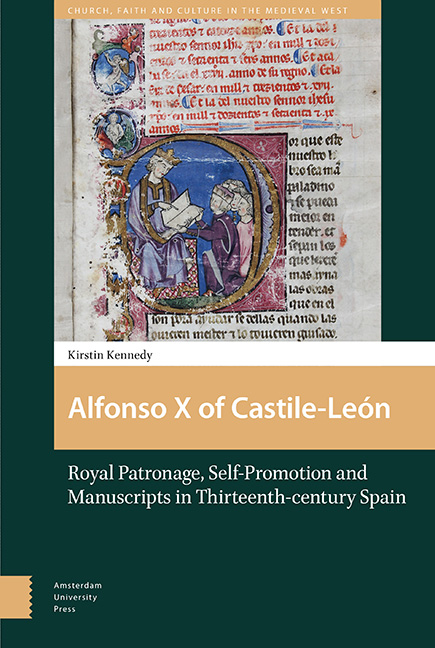 Alfonso X of Castile-León
Alfonso X of Castile-León Book contents
- Frontmatter
- Dedication
- Contents
- Acknowledgements
- List of Figures
- Abbreviations
- Introduction: ‘the king Makes a Book’
- 1 Alfonso X, his Literary Patronage, and the Verdict of Historians
- 2 Alfonso in his Texts: literary Models and Royal Authorship
- 3 Reality, Politics, and Precedent in Images of Alfonso
- 4 Codices Laid Out for a King : the Appearance and Production of Alfonsine Manuscripts
- 5 The Circulation of Alfonsine Texts: Astrological Works and Chronicles
- Concluding Remarks
- Manuscript Sources
- Index
1 - Alfonso X, his Literary Patronage, and the Verdict of Historians
Published online by Cambridge University Press: 21 November 2020
- Frontmatter
- Dedication
- Contents
- Acknowledgements
- List of Figures
- Abbreviations
- Introduction: ‘the king Makes a Book’
- 1 Alfonso X, his Literary Patronage, and the Verdict of Historians
- 2 Alfonso in his Texts: literary Models and Royal Authorship
- 3 Reality, Politics, and Precedent in Images of Alfonso
- 4 Codices Laid Out for a King : the Appearance and Production of Alfonsine Manuscripts
- 5 The Circulation of Alfonsine Texts: Astrological Works and Chronicles
- Concluding Remarks
- Manuscript Sources
- Index
Summary
The future Alfonso X was born in Toledo on St Clement's day, 23 November 1221. He was the eldest son of the twenty-year-old Fernando III, king of Castile, and his twenty-three-year-old wife Beatriz, daughter of the late emperor-elect Philip of Swabia and granddaughter of the emperor Frederick I Barbarossa. His mother's ancestry was to underpin his candidature to the imperial throne, a candidature which he defended while still a prince against his younger brother Fadrique, who had been named after the emperor Fredrick, and which he pursued for almost his entire reign. When he was just four months old, on 21 March 1222, representatives from all parts of Castile and León recognized him as their feudal lord at Burgos. Aged nineteen in 1240, he was promised in marriage to the three-year-old Violante, daughter of Jaume I of Aragon. The couple finally married at Valladolid on 29 January 1249. His love of learning, meanwhile, may have begun at an early age and was arguably remarked upon even before he acceded to the throne. In 1250, Guillermo Pérez de la Calzada, the former abbot of Sahagún, described him as the ‘first-born of the king [Fernando], skilful Alfonso, | virtuous father of his country, learned in everything,| modest in his habits’ (‘Regis primogenitus, Alfonsus peritus, | Probus pater patriae, cunctis eruditus, | modestus in moribus’). The context of this praise was Alfonso's triumphant entry into Seville with his father Fernando, which had surrendered to Christian forces (and to those of their Nasrid allies from Granada) after a long campaign of harassment and a siege that lasted over a year. In his dedicatory prose prologue, Pérez de la Calzada hoped that his flattering account of the victory would be included in official chronicles.
It is tempting to read this hope, and the deposed abbot's description of Alfonso as ‘eruditus’, as evidence for Alfonsine literary activities that predate his accession to the throne: the poem arguably presents a new model of kingship characterized by learning. It is surely significant in the light of Alfonso's later patronage that Pérez de la Calzada identifies the prince and not his father the king as a potential patron interested in historical writings.
- Type
- Chapter
- Information
- Alfonso X of Castile-LeónRoyal Patronage, Self-Promotion and Manuscripts in Thirteenth-century Spain, pp. 45 - 88Publisher: Amsterdam University PressPrint publication year: 2019


